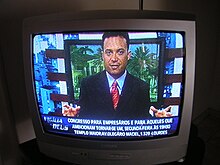
Back Televangelisme Afrikaans تبشير تلفازي Arabic Teleevangelisme Catalan Fernsehprediger German Televangelismo Esperanto Telepredicación Spanish کشیش تلویزیونی Persian Télévangélisme French Telepenginjilan ID Telepredicazione Italian

Televangelism (from televangelist, a blend of television and evangelist) and occasionally termed radio evangelism or teleministry, denotes the utilization of media platforms, notably radio and television, for the marketing of religious messages, particularly Christianity.
Televangelists are either official or self-proclaimed ministers who devote a large portion of their ministry to television broadcasting. Some televangelists are also regular pastors or ministers in their own places of worship (often a megachurch), but the majority of their followers come from TV and radio audiences. Others do not have a conventional congregation, and work primarily through television. The term is also used derisively by critics as an insinuation of aggrandizement by such ministers.
Televangelism began as a uniquely American phenomenon, resulting from a largely deregulated media where access to television networks and cable TV is open to virtually anyone who can afford it, combined with a large Christian population that is able to provide the necessary funding. It became especially popular among Evangelical Protestant audiences, whether independent or organized around Christian denominations. However, the increasing globalisation of broadcasting has enabled some American televangelists to reach a wider audience through international broadcast networks, including some that are specifically Christian in nature.
Some countries have a more regulated media with either general restrictions on access or specific rules regarding religious broadcasting. In such countries, religious programming is typically produced by TV companies (sometimes as a regulatory or public service requirement) rather than private interest groups.